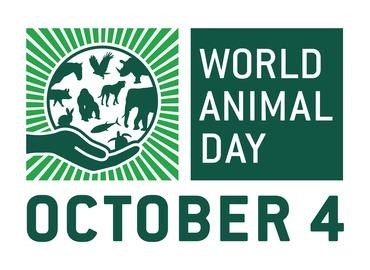MISSION OF WORLD ANIMAL DAY is to raise the status of animals in order to improve welfare standards around the globe. Building the celebration of World Animal Day unites the animal welfare movement, mobilising it into a global force to make the world a better place for all animals. It’s celebrated in different ways in every country, irrespective of nationality, religion, faith or political ideology. Through increased awareness and education we can create a world where animals are always recognised as sentient beings and full regard is always paid to their welfare.

World Animal Day is a day of action recognised worldwide for animal rights as well as welfare. It is celebrated on 4 October, which happens to be the feast day of Francis of Assisi, who is considered as the animals’ patron saint. During International Animal Protection Congress in Florence Italy, in May 1931, the proposal to make 4 October as World Animal Day universally, was unanimously accepted and adopted as a resolution.
The objective of World Animal Welfare Day is to raise the status of animals in order to improve welfare standards around the globe. To unite the animal welfare movement, mobilising it into a global force to make the world a better place for all animals. It’s celebrated in different ways in every country, irrespective of nationality, religion, faith or political ideology. Through increased awareness and education we can create a world where animals are always recognised as sentient beings and full regard is always paid to their welfare.
Animals help humans in innumerable ways, from professional support (as guide dogs for the blind or as therapy dogs) to offering love and companionship in daily lives. Numerous studies have shown the positive effect animals have on both the physical and mental health of humans, which can be appreciated and used in many ways.
Whether they are dogs, cats, guinea pigs, monkeys, llamas, pigs or hens, animals help humans in countless vital ways. They often make a valuable contribution to human health and recovery – taking an important role, for example, in therapy and rehabilitation programmes. They have a positive effect on physical and mental health, they give us emotional support, they help prisoners adjust to a conflict-free life outside of prison, and can be a calm anchor in stressful situations. Animals reduce the fear of their owner in threatening situations; they guide the blind; they warn those in danger of diabetic or epileptic fits. Animals are our soul-mates, helpers and friends.
We must be aware of the responsibility we have towards our soul-mates, friends and helpers. This responsibility does not only include meeting the needs of the animals each and every day. It also means making a well-considered decision for adopting an animal and to guarantee a forever home for them, because, already shelters are overrun with many others desperate for homes.
Animal welfare includes all aspects of animal wellbeing. In its simplest form, animal welfare refers to the relationships people have with animals and the duty they have to assure that the animals under their care are treated humanely and responsibly. Every animal is entitled to have a good and healthy life where they can enjoy the benefits for their wellbeing. In animal welfare document the Five Freedoms are widely cited, which includes;
- Freedom from Hunger and Thirst – by ready access to fresh water and a diet to maintain full health and vigour
- Freedom from Discomfort – by providing an appropriate environment including shelter and a comfortable resting area
- Freedom from Pain, Injury or Disease – by prevention or rapid diagnosis and treatment
- Freedom to Express Normal Behaviour – by providing sufficient space, proper facilities and company of the animal’s own kind
- Freedom from Fear and Distress – by ensuring conditions and treatment which avoid mental suffering
These freedoms include consideration for all aspects of animal well-being, which can be seen as the Five Domains of Animal Welfare. These domains should be at the forefront of every human action involving animals;
- Nutrition – factors that involve the animal’s access to sufficient, balanced, varied, and clean food and water
- Environment – factors that enable comfort through temperature, substrate, space, air, odour, noise, and predictability
- Health – factors that enable good health through the absence of disease, injury, impairment with a good fitness level
- Behaviour – factors that provide varied, novel, and engaging environmental challenges through sensory inputs, exploration, foraging, bonding, playing, retreating, and others
- Mental State – by presenting positive situations in the previous four functional domains, the mental state of the animal should benefit from predominantly positive states, such as pleasure, comfort, or vitality while reducing negative states such as fear, frustration, hunger, pain, or boredom.
Animal Rights Every Indian Should Know
India has some of the finest provisions to safeguard animals in the world. Many of us may be unaware of the laws compassionate lawmakers have passed to safeguard animals. Here is the lowdown on legislation in relation to animal welfare in India so that we can be informed of what protections are available to animals.




इस सृष्टि का सृजन सभी जीव जन्तुओं के द्वारा हुआ है। सृष्टि का कोई भी हिस्सा यदि अलग। ।होता है तो सृष्टि की व्यवस्था बिगड जाती हैं है।
LikeLike
विश्व पशु दिवस की हार्दिक शुभकामनायें। ऐसे मौके पर हम सभी शपथ लें कि पशुओं की रक्षा करेंगे।
LikeLike
It is a lovely moment to celebrate Animals day with love and care.It is the duty of every citizen of this world to live,take care and protect Animals,all living creatures.Let we citizens of the world community hold our hands together and celebrate
Animals day with love and care.
World Animal Cares and Adoption.com. 0091 07678061299
LikeLike
Thank you community of all Animal lovers. In this world,to come forward and celebrate World Animals day.
LikeLike